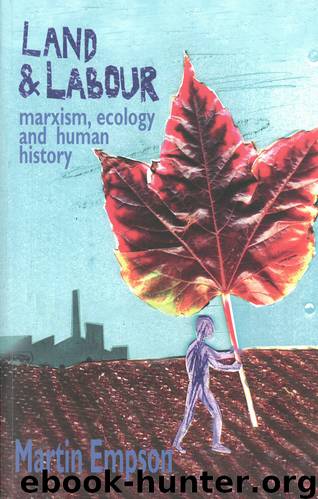Land and Labour by Martin Empson

Author:Martin Empson
Language: eng
Format: epub
ISBN: 9781909026544
Publisher: Bookmarks
Farming under neoliberalism
At the end of the 20th century and the start of the 21st world agriculture was dominated by the global economic policies known as neoliberalism. David Harvey describes what this means to the nation states:
The neoliberal state looks to further the cause of and to facilitate and stimulate…all business interests, arguing that this will foster growth and innovation and that this is the only way to eradicate poverty and to deliver, in the long run, higher living standards to the mass of the population. The neoliberal state is assiduous in seeking the privatisation of assets as a means to open up fresh fields for capital accumulation.444
Thus we see cuts in state spending, the privatisation and dismantling of public services, and the opening up of economies. In agriculture, neoliberalism means the “dismantling, in developing countries only, of all price support mechanisms which existed earlier for stabilising prices for peasant producers” and a “sustained attack on peasant-owned or occupied land”.445
The international body most associated with neoliberalism is the World Trade Organisation (WTO). Launched in December 1995, the WTO inherited a number of trade agreements from pre-existing bodies, but for the first time agriculture was included as part of international trade agreements. This had proved to be a major point of contention in negotiations. For the rich nations, the setting up of the WTO was part of a strategy to reshape the global economy in their interests. Both the European Union and the US had strong domestic arrangements for subsidies to their own agriculture. But this was precisely what they wanted to dismantle in the developing world. As Raj Patel comments, the aim of the EU and US “was to keep their strategic reserves of food, while forcing countries in the Global South to cede sovereignty of their agricultural supplies…the EU and US were able…to develop a system of agricultural supports that, in essence, let them continue to subsidise their farmers while countries in the Global South signed away precisely this right”.446
Since the mid-1990s trade agreements have forced developing countries to open their borders to cheap, subsidised food from the developed world. Simultaneously, developing countries were urged to remove domestic protection for their own agriculture. After independence many former colonies had instigated such protection to enable them to break free of the unequal trade arrangements that had been imposed upon them by their former colonial rulers. Governments dismantled their systems of protection for domestic farmers, their systems of grain procurement and distribution. This made them dependent on food imports, but the neoliberal idea was that countries should produce crops for export to raise capital to pay for imports.
Unfortunately this strategy of “export specialisation” failed. Utsa Patnaik explains what happened:
The promises of increased export earnings and ability to access food from global markets proved misleading and false even before the current inflation started. First, with dozens of developing countries following the same policies of exporting much the same products, the unit dollar price of their exports declined and terms of trade moved
Download
This site does not store any files on its server. We only index and link to content provided by other sites. Please contact the content providers to delete copyright contents if any and email us, we'll remove relevant links or contents immediately.
| Anarchism | Communism & Socialism |
| Conservatism & Liberalism | Democracy |
| Fascism | Libertarianism |
| Nationalism | Radicalism |
| Utopian |
The Secret History by Donna Tartt(19010)
The Social Justice Warrior Handbook by Lisa De Pasquale(12179)
Thirteen Reasons Why by Jay Asher(8878)
This Is How You Lose Her by Junot Diaz(6865)
Weapons of Math Destruction by Cathy O'Neil(6253)
Zero to One by Peter Thiel(5776)
Beartown by Fredrik Backman(5722)
The Myth of the Strong Leader by Archie Brown(5485)
The Fire Next Time by James Baldwin(5418)
How Democracies Die by Steven Levitsky & Daniel Ziblatt(5207)
Promise Me, Dad by Joe Biden(5135)
Stone's Rules by Roger Stone(5070)
A Higher Loyalty: Truth, Lies, and Leadership by James Comey(4942)
100 Deadly Skills by Clint Emerson(4902)
Rise and Kill First by Ronen Bergman(4766)
Secrecy World by Jake Bernstein(4733)
The David Icke Guide to the Global Conspiracy (and how to end it) by David Icke(4691)
The Farm by Tom Rob Smith(4494)
The Doomsday Machine by Daniel Ellsberg(4477)
